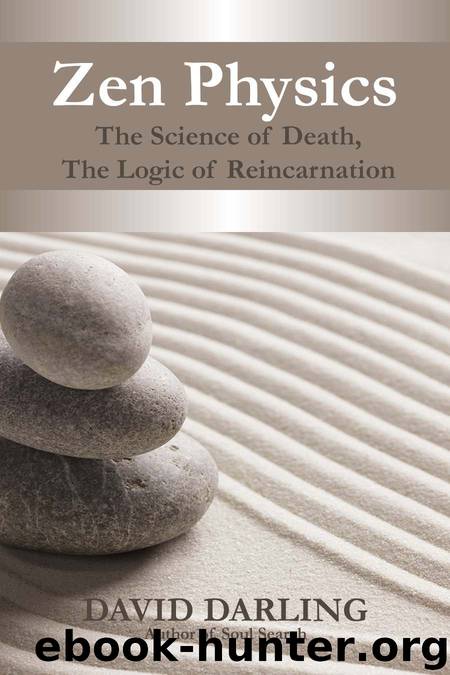Zen Physics, The Science of Death, the Logic of Reincarnation by David Darling

Author:David Darling [Darling, David]
Language: eng
Format: azw3, epub
Tags: death, consciousness, reincarnation, science, mind, brain, sould, zen
Publisher: First Edition Design Publishing
Published: 2012-08-02T16:00:00+00:00
Chapter 8 – You Again
What is a friend? A single soul dwelling in two bodies.
– Aristotle
So here we are: brains in conversation, trying to understand and come to terms with death. We want to know what it will involve, what it will feel like, what will happen after the last shallow breath and feeble heartbeat, after the sheet is finally drawn over our still features. Of this much we can be certain: within a matter of minutes, at some future time, our brains will become terminally starved of oxygen and will cease to function. All of the memories they so recently held, together with the power to integrate two selves – you and I – will be lost. Put this way, it sounds catastrophic. It sounds hopeless, terrifying, terrible. But how will it really be for us when the time comes?
Our great difficulty in thinking about death is that we can see it only in others, never in ourselves. (I'm reminded of a quote from a dying student nurse in Allegra Taylor's book Acquainted with the Night “Death may get to be a routine for you, but it is new to me. You may not see me as unique, but I've never died before.”) And viewed objectively it does look depressing – lifeless corpses, despair, mourning, decay, loss. Since our only contact with death is as an outsider this is our natural basis for envisaging what our own death will be like. But our own death is special and unique, because we shall be part of it, inside it, the one who actually dies. And as experienced, rather than observed, death is a very different proposition.
Witnesses regularly report that in the last days or hours of life, a dying person will appear serenely calm and at peace with the world, and even, on occasions, extraordinarily joyful and elated. And there are the reassuring testimonies, too, of people who have been through near-death experiences in which reference is often made to almost indescribably blissful sensations. The final passage leading to death is evidently, in the great majority of cases, not at all unpleasant. Indeed, for those who have suffered from a long, painful, or debilitating illness, such as cancer, the immediate prelude to death can be anticipated as a time of welcome deliverance from suffering. As for the moment of death itself, if we take this to mean the total breakdown of cognitive function (brain death) at the end of a person's life, then, as experienced, it will be over in a painless, trouble-free instant.
To those who knew and loved a person who has just died there is obviously great regret and sadness at his or her departure. But, if we are being honest (and it is especially hard to be objective about such matters following a bereavement), at least a part – and perhaps a very large part – of the sadness we feel is for ourselves because we have lost someone dear, like a cherished possession. We will no longer have the pleasure of their company, and so we are consumed, understandably, by self pity.
Download
Zen Physics, The Science of Death, the Logic of Reincarnation by David Darling.epub
This site does not store any files on its server. We only index and link to content provided by other sites. Please contact the content providers to delete copyright contents if any and email us, we'll remove relevant links or contents immediately.
| Anthropology | Archaeology |
| Philosophy | Politics & Government |
| Social Sciences | Sociology |
| Women's Studies |
Nudge - Improving Decisions about Health, Wealth, and Happiness by Thaler Sunstein(7678)
The Fire Next Time by James Baldwin(5409)
iGen by Jean M. Twenge(5398)
Adulting by Kelly Williams Brown(4552)
The Sports Rules Book by Human Kinetics(4367)
The Hacking of the American Mind by Robert H. Lustig(4355)
The Ethical Slut by Janet W. Hardy(4232)
Captivate by Vanessa Van Edwards(3827)
Mummy Knew by Lisa James(3670)
In a Sunburned Country by Bill Bryson(3524)
The Worm at the Core by Sheldon Solomon(3468)
Ants Among Elephants by Sujatha Gidla(3450)
The 48 laws of power by Robert Greene & Joost Elffers(3203)
Suicide: A Study in Sociology by Emile Durkheim(3002)
The Slow Fix: Solve Problems, Work Smarter, and Live Better In a World Addicted to Speed by Carl Honore(2990)
The Tipping Point by Malcolm Gladwell(2896)
Humans of New York by Brandon Stanton(2860)
Handbook of Forensic Sociology and Psychology by Stephen J. Morewitz & Mark L. Goldstein(2687)
The Happy Hooker by Xaviera Hollander(2678)
